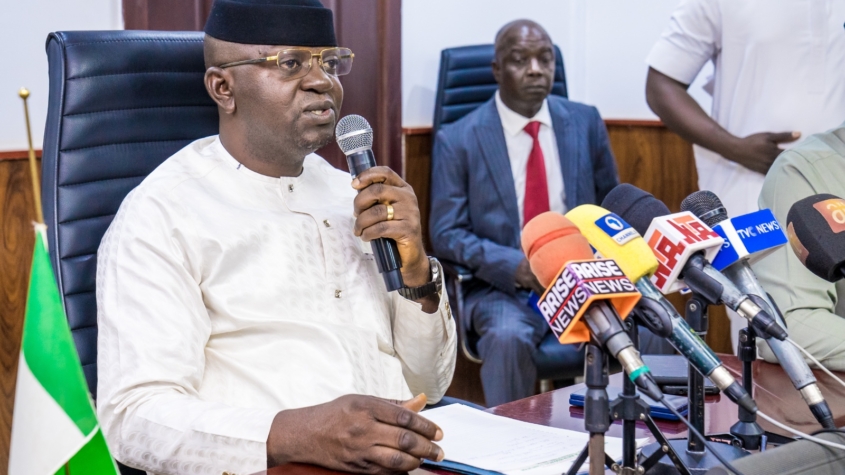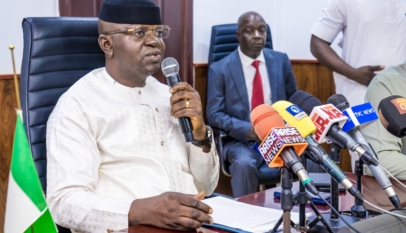
Nigeria: Mokwa Flood Not Caused by Dam Release, Says Minister
Climate Change, Poor Planning to Blame
The recent flood disaster in Mokwa, Niger State, was not triggered by any release from the Kainji or Jebba dams, which remain “intact and safe,” according to the Minister of Water Resources and Sanitation, Engr. Prof. Joseph Utsev.
Speaking at a press briefing on Tuesday in Abuja, Prof. Utsev commended the swift response of the Niger State Government, local authorities, and first responders who have been actively providing relief to affected residents.
The Minister clarified that the flooding was primarily the result of heavy rainfall caused by extreme weather conditions linked to climate change. He said this was compounded by unregulated construction activities that obstructed an ephemeral tributary of River Dingi—a regressive stream that feeds into the River Niger and remains dry for most of the year, flowing only during rainfall events.
According to him, the absence of efficient alternative pathways to redirect excess water further worsened the flood’s impact on the affected communities.
He stated, “Nigerians will recall that the Federal Ministry of Water Resources and Sanitation, through the Nigeria Hydrological Services Agency (NIHSA), predicted flooding in 19 Local Government Areas of Niger State, including Mokwa LGA, in its 2025 Annual Flood Outlook (AFO) released on April 10, 2025.”
Prof. Utsev explained that the 2025 AFO forecast identified 1,249 communities in 176 LGAs across 33 states and the FCT as being within high flood risk areas, while 2,187 communities in 293 LGAs in 31 states and the FCT were categorized as moderate flood risk areas.
He added, “The high flood risk states include: Abia, Adamawa, Akwa Ibom, Anambra, Bauchi, Bayelsa, Benue, Borno, Cross River, Delta, Ebonyi, Edo, FCT, Gombe, Imo, Jigawa, Kebbi, Kogi, Kwara, Lagos, Nasarawa, Niger, Ogun, Ondo, Osun, Oyo, Rivers, Sokoto, Taraba, Yobe, and Zamfara.”
The Minister, however, urged state and local governments to act on these early warnings by strengthening drainage infrastructure, relocating vulnerable communities from flood plains, engaging in sustained public awareness campaigns, and enforcing land-use regulations to prevent encroachment into flood-prone areas.
He emphasized, “The AFO provides a comprehensive overview of flood risks down to the community level, indicating potential flood-prone areas, expected flood levels, and recommended adaptation and mitigation measures. It also highlights how communities can adopt innovative approaches to reduce vulnerability.”
“Stakeholders are therefore advised to visit the dashboard at https://nihsa.gov.ng/flood-forecast-dashboard for detailed information and to take proactive steps in mitigating flood impacts in their areas.”
“This flood event, like many others in recent years, is a stark reminder of the increasing impacts of climate change on our environment and water systems. Extreme weather events—including intense rainfall and river flooding—are becoming more frequent and severe across the country and globally. These events not only disrupt livelihoods but also challenge the resilience of our infrastructure and environment.”
“As a Ministry, we remain fully committed to our mandate of managing the nation’s water resources in a sustainable and climate-resilient manner. We call on all stakeholders—government agencies, the private sector, civil society organizations, and community leaders—to work together in building safer, more resilient communities.”
He noted that technical personnel from the Ministry, the Nigeria Hydrological Services Agency (NIHSA), the Upper Niger River Basin Development Authority (UNRBDA), and the National Water Resources Institute (NWRI) are on the ground in Mokwa conducting assessments of the flood to prepare a detailed report.
“We once again express our condolences and unwavering support to the people and Government of Niger State. Let us remember that flooding is not just a natural phenomenon; it is a developmental challenge, and we must all rise to the occasion,” he said.




